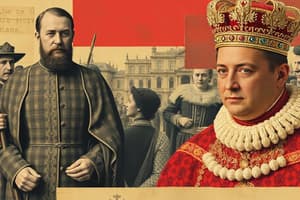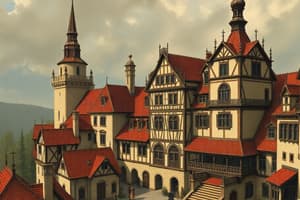Podcast
Questions and Answers
What was Feudalism?
What was Feudalism?
- A decentralized economic and political system (correct)
- A method for urban development
- A centralized economic and political system
- A system based on democratic principles
What is a feudal contract?
What is a feudal contract?
An exchange of pledges that created a relationship between lords and vassals.
Who is a vassal?
Who is a vassal?
A lesser lord who swore loyalty to more powerful lords.
What does a fief include?
What does a fief include?
What is a knight?
What is a knight?
What is chivalry?
What is chivalry?
What is a manor?
What is a manor?
What defines a serf?
What defines a serf?
Study Notes
Feudalism
- A decentralized political and economic system where local lords managed landholdings to offer protection against invasions by the Magyars, Muslims, and Vikings.
- Developed due to the inability of kings and emperors to maintain order during times of invasion.
- The structure and implementation of feudalism varied by region and evolved over time.
Feudal Contract
- An established exchange of pledges that defined the relationship between lords and vassals, focusing on loyalty and military service in return for land.
- A powerful lord granted a fief, an estate that included land, buildings, and peasants to work the land, to their vassals.
Vassal
- A lesser lord who pledged loyalty and service to a more powerful lord, receiving protection in exchange.
- Vassals were granted fiefs, which included land and peasants, through the feudal contract, rooted in customs and traditions.
Fief
- An estate given to a vassal by a greater lord as part of the feudal contract.
- Fiefs varied greatly in size from a few acres to hundreds of square miles, encompassing land, towns, and peasants.
Knight
- A mounted warrior trained from the age of seven to fight, ride, and maintain weapons and armor.
- After rigorous training, a boy was ceremonially dubbed a knight and participated in battles and tournaments using swords, lances, and axes.
Chivalry
- A code of conduct for knights during the Middle Ages emphasizing loyalty, bravery, and fairness in battle.
- Mandated the protection of the weak, including noblewomen and peasants, though its application largely excluded commoners.
Manor
- The central unit of feudal economy, typically comprising one or more villages and surrounding lands.
- Manors were predominantly populated by peasants, including serfs who worked the land and were tied to it.
Serf
- Peasants bound to the manor, lacking freedom but distinct from slaves, as they could not be bought or sold.
- Required permission from their lord to leave the manor and transferred with the manor to any new lord if one was assigned.
Studying That Suits You
Use AI to generate personalized quizzes and flashcards to suit your learning preferences.
Description
Dive into the key concepts of Feudalism in this chapter 7, section 2 overview. Understand how local lords and vassals interacted in a decentralized system to provide protection against invasions. This quiz will help reinforce your knowledge of this critical historical structure.




